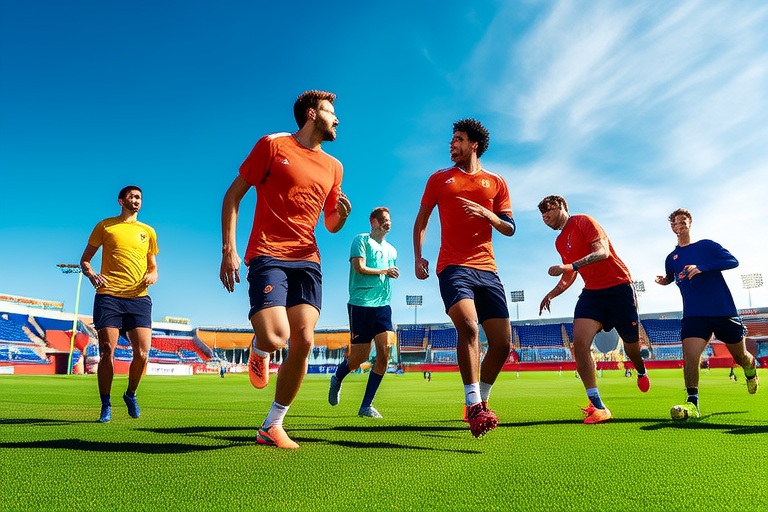Introduction to the Diverse World of Sports: Exploring Different Types and Their Benefits
Sports are an integral part of human culture, offering a platform for physical activity, social interaction, and personal growth. From team sports that foster camaraderie to individual pursuits that test one’s limits, the world of sports is vast and diverse. This article explores different categories of sports, including team sports, individual sports, water sports, and extreme sports, highlighting their unique characteristics and benefits. Additionally, we will discuss how participation in sports can significantly improve overall well-being.
Team Sports: The Power of Collaboration
Team sports involve multiple players working together toward a common goal. These sports emphasize collaboration, communication, and strategy, making them ideal for fostering strong interpersonal relationships. Examples of popular team sports include soccer, basketball, volleyball, and cricket.
Characteristics of Team Sports
One of the defining features of team sports is the reliance on group dynamics. Success often depends on how well players understand each other’s strengths and weaknesses. Team sports also require leadership skills, as players must coordinate efforts and make quick decisions under pressure. The competitive nature of these sports adds excitement, motivating participants to push their limits.
Physical and Mental Health Benefits
Engaging in team sports provides numerous physical health benefits, such as improved cardiovascular fitness, enhanced muscle strength, and better coordination. Beyond physical gains, these activities also contribute to mental well-being by reducing stress, boosting self-esteem, and promoting a sense of belonging. The social aspect of team sports helps combat feelings of isolation and loneliness, which are critical for maintaining mental health.
Individual Sports: Testing Personal Limits
In contrast to team sports, individual sports focus on personal achievement rather than collective success. Athletes in this category compete against themselves or others, striving to achieve personal bests or outperform rivals. Common examples include tennis, swimming, gymnastics, and track and field events.
Characteristics of Individual Sports
Individual sports place a strong emphasis on self-discipline, perseverance, and mental toughness. Athletes must rely solely on their skills and preparation, which fosters independence and accountability. These sports often require meticulous attention to detail, whether it’s perfecting a technique or strategizing during a match.
Physical and Mental Health Benefits
Participating in individual sports enhances physical fitness by improving endurance, flexibility, and agility. Mentally, these activities teach resilience and focus, as athletes learn to manage pressure and setbacks. The sense of accomplishment from achieving personal goals can be incredibly rewarding, leading to increased confidence and motivation in other areas of life.
Water Sports: Embracing the Element of Water
Water sports take place in aquatic environments and range from recreational activities to highly competitive disciplines. Swimming, surfing, rowing, and diving are just a few examples of water sports that attract enthusiasts worldwide.
Characteristics of Water Sports
What sets water sports apart is their reliance on the unique properties of water, such as buoyancy and resistance. These sports often require specialized equipment and techniques, adding an element of adventure and skill development. Many water sports also offer breathtaking views and a connection to nature, enhancing the overall experience.
Physical and Mental Health Benefits
Water sports provide excellent cardiovascular workouts while being gentle on the joints due to the buoyant nature of water. They also help build core strength, balance, and coordination. On a mental level, engaging with water has a calming effect, reducing anxiety and promoting relaxation. For many, the combination of physical exertion and serene surroundings creates a meditative experience.
Extreme Sports: Pushing the Boundaries
Extreme sports, also known as adventure sports, involve high levels of risk and adrenaline. Activities like rock climbing, skydiving, bungee jumping, and snowboarding appeal to thrill-seekers who crave excitement and challenge.
Characteristics of Extreme Sports
Extreme sports are defined by their unconventional nature and the element of danger involved. Participants must possess exceptional courage, skill, and adaptability to navigate unpredictable environments. These sports often require specialized training and equipment to ensure safety while maximizing the thrill.
Physical and Mental Health Benefits
While extreme sports may seem daunting, they offer significant health benefits. Physically, they enhance strength, agility, and reflexes, as participants must react quickly to changing conditions. Mentally, these sports promote focus, problem-solving, and stress relief. Overcoming fears and achieving milestones in extreme sports can lead to profound personal growth and a heightened sense of accomplishment.
The Holistic Impact of Sports on Well-Being
Regardless of the type, participating in sports has a transformative impact on overall well-being. Regular physical activity reduces the risk of chronic diseases, such as obesity, diabetes, and heart conditions. It also improves sleep quality, boosts energy levels, and enhances cognitive function.
Mentally, sports serve as a powerful antidote to stress, depression, and anxiety. The endorphins released during exercise create a “feel-good” effect, while the social interactions fostered by many sports contribute to emotional resilience. Moreover, sports instill values such as discipline, teamwork, and perseverance, which translate into success in other aspects of life.
For children and adolescents, sports play a crucial role in development. They teach essential life skills, encourage healthy habits, and provide opportunities for positive mentorship. Adults benefit from sports as a means of staying active, building friendships, and finding purpose outside of work. Even seniors can enjoy modified versions of sports to maintain mobility and independence.
Conclusion
The world of sports is as diverse as it is enriching, offering something for everyone regardless of age, ability, or preference. Whether you thrive in the collaborative environment of team sports, relish the solitude of individual pursuits, embrace the tranquility of water sports, or seek the adrenaline rush of extreme activities, there is no shortage of options to explore.
Beyond the physical and mental health benefits, sports have the power to unite communities, inspire greatness, and foster lifelong passions. By incorporating sports into your routine, you can embark on a journey of self-discovery, resilience, and holistic well-being. So lace up your sneakers, grab your gear, and dive into the exciting world of sports—your body and mind will thank you!










